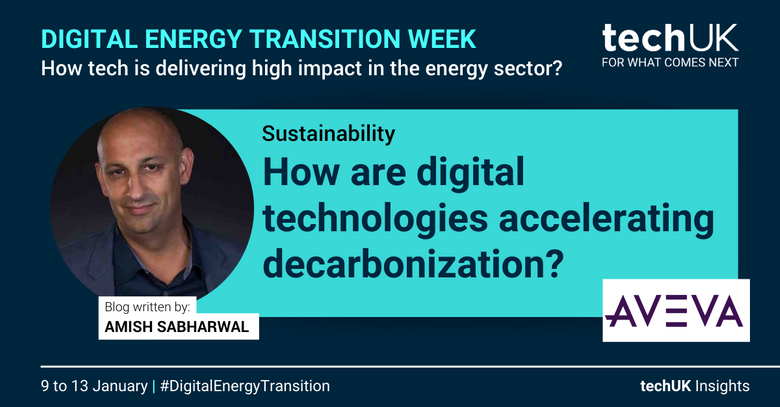Digitising the energy transition: How are digital technologies accelerating decarbonisation? (Guest blog by AVEVA)

Digital technologies can help achieve up to 75% of the United Nations Sustainable Development Goals, including significant reductions in greenhouse gas emissions.
By some estimates, digital technologies can cut emissions by up to 50% by 2030. That’s more than the carbon footprint of the US and the EU combined.
In the past two years, more than 25% of the world’s largest industrial companies have pledged to cut emissions to net zero.
The energy transition and decarbonisation are the biggest challenges that this generation will face. With growing energy demand and increasing focus on energy security and supply resiliency, governments and businesses alike have turned to digital strategies to shape the new energy landscape. We have identified three big opportunity areas:
-
Integrated data management. Integrating operations and engineering data enables engineers do their jobs more efficiently, while data scientists and modelers use this integrated data to predict the future. Yet data scientists spend 45% of their time analysing data and 15-20% visualising it. Imagine if you could automate that effort using live data and analytics that span your entire industrial lifecycle. This process is happening now for the leading companies that are using insights to unlock new opportunities to decarbonise.
-
Industrial artificial intelligence. AI can change how industries operate, and the pace of its adoption is speeding up. Gartner predicts that industrial AI adoption will increase by 21.3% in 2022, as companies use AI to streamline operations, reduce costs, boost efficiencies, drive resiliency, and improve safety and sustainability.
-
Cloud. Cloud technology can transform how teams collaborate and share data, enabling new agile working models that provide scope, scale, and computing power to drive decarbonization.
Early adopters are already pivoting their businesses to develop a digital thread. Using unified data from throughout an organisation’s engineering and operations, enriching it with sector-specific AI and simulation, gives that business the ability to predict probable failures and suggest a set of actions to mitigate losses, problems, or underperformance.
From a sustainability perspective, this digital thread can help to eliminate fugitive emissions, decarbonise supply chains, and vastly reduce the carbon generated as a result of operations all while increasing revenue.
The carbon transition requires a new way of thinking
Realising the energy transition is going to demand that we rebuild value chains and switch to decarbonised operating models. And, as the world is rocked by energy shocks, we need to ensure that agility and resiliency are not sacrificed in the rush to decarbonise.
About AVEVA
AVEVA is named one of the world’s most innovative companies for pioneering sustainable technologies. So far in this decade we’ve helped engineers factor greenhouse gas reduction into plant designs, optimize their solar energy production, operate remotely, and achieve net zero goals using AI and industrial data sharing.
Get involved with our work
All of techUK’s work is led by our members – keep in touch or get involved with our work on transport and infrastructure by joining our groups.





